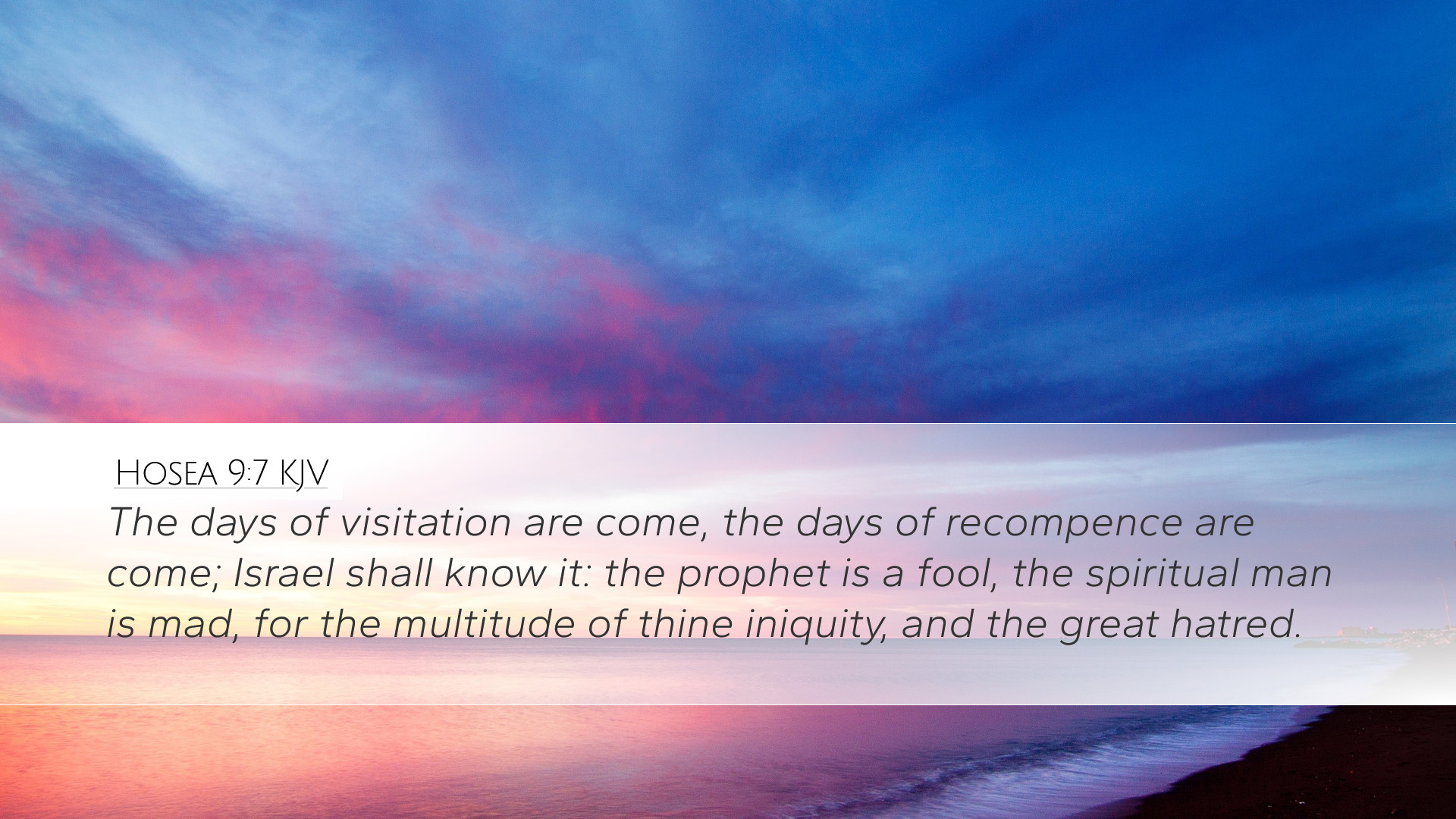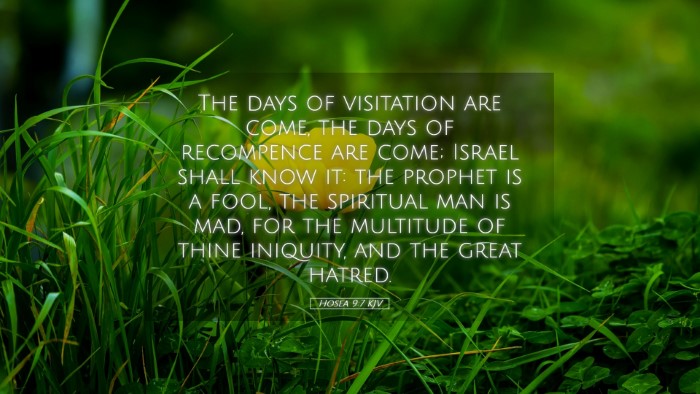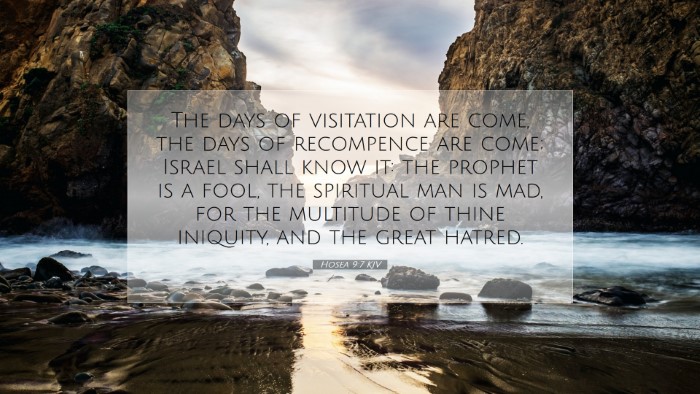Old Testament
Genesis Exodus Leviticus Numbers Deuteronomy Joshua Judges Ruth 1 Samuel 2 Samuel 1 Kings 2 Kings 1 Chronicles 2 Chronicles Ezra Nehemiah Esther Job Psalms Proverbs Ecclesiastes Song of Solomon Isaiah Jeremiah Lamentations Ezekiel Daniel Hosea Joel Amos Obadiah Jonah Micah Nahum Habakkuk Zephaniah Haggai Zechariah MalachiHosea 9:7
Hosea 9:7 KJV
The days of visitation are come, the days of recompence are come; Israel shall know it: the prophet is a fool, the spiritual man is mad, for the multitude of thine iniquity, and the great hatred.
Hosea 9:7 Bible Commentary
Commentary on Hosea 9:7
Text of Hosea 9:7 (KJV): "The days of visitation are come, the days of recompense are come; Israel shall know it: the prophet is a fool, the spiritual man is mad, for the multitude of thine iniquity, and the great hatred."
Introduction
The verse Hosea 9:7 serves as a critical juncture in the prophetic message of Hosea, demonstrating God's judgment against the people of Israel. As we explore this text, we shall draw insights from public domain commentaries by Matthew Henry, Albert Barnes, and Adam Clarke. Each of these scholars provides a unique perspective that sheds light on the historical context, theological implications, and the overall message of Hosea.
Historical Context
Hosea prophesied during a tumultuous time in Israel's history, marked by spiritual decline, idolatry, and social injustice. The northern kingdom of Israel was facing impending judgment due to their rejection of God and the worship of Baal. Hosea's message was directed towards a people unaware of their spiritual peril. The reference to days of visitation and recompense signifies the certainty of divine intervention in response to Israel’s manifold sins.
Insights from Matthew Henry
Matthew Henry comments on the profound implications of divine visitation. He notes that, "when God visits a people, it is with either mercy or judgment." In this case, Israel's visitation comes with severe consequences, reflecting God's displeasure at their iniquity. Henry emphasizes that the true prophet is often seen as foolish by a sinful generation, a theme echoed throughout the prophetic books. The rejection of God's messengers indicates a larger spiritual crisis among the Israelites, where they dismiss divine truth in favor of false security.
Insights from Albert Barnes
Albert Barnes expounds on the phrase "the prophet is a fool". He suggests that this reflects a societal norm where divine truth is ridiculed. "The people, consumed by their sins, attribute madness to those who call them to repentance,” Barnes asserts. He further underscores the concept of 'recompense,' illustrating that God’s justice is inescapable. The mention of spiritual madness highlights the deep moral confusion within the community, as they are blinded by sin and unable to recognize their true state before God.
Insights from Adam Clarke
Adam Clarke provides a theological reflection on the consequences of Israel's iniquity. He writes that the great hatred mentioned in the verse points to the animosity that arises when a nation forsakes its covenant with God. Clarke notes: "A disregard to divine guidance not only leads to personal folly but perpetuates collective deterioration." The "days of recompense" are not simply future events; they signify a current state of moral decay that the Israelites must confront. Clarke calls attention to the irony that the blind pursuit of pleasure has led them to despise the means of true wisdom and truth.
Theological Themes
Several theological themes emerge from Hosea 9:7 that resonate across time. The nature of God's judgment, the role of prophetic voices, and the consequences of sin are pivotal to understanding this passage.
God's Judgment
The "days of visitation" mentioned are not just a future prophecy; they are a current reality. God’s judgment is portrayed not merely as punitive but as redemptive, seeking to bring the people back to a place of recognition and repentance. This serves as a reminder that God's justice is integral to His character—swift and sure, aiming at restoring His people rather than irreparably destroying them.
The Role of Prophets
Hosea exemplifies the plight of prophetic voices in a disbelieving society. The derision faced by prophets like Hosea reflects the broader attitude towards God's spokespeople throughout Scripture. This societal scorn serves as a stark warning that the rejection of God’s truth can lead to devastating consequences. Pastors and theologians are reminded that fidelity to divine truth, even in the face of hostility, is paramount in their ministries.
Consequences of Sin
This verse encapsulates the heavy burden of sin. The Israelites’ refusal to acknowledge their iniquity resulted in the acknowledgment that they were spiraling into madness. The ultimate consequence of this madness is alienation from God’s love and purpose. The repeated themes throughout the Bible, echoing through the prophetic literature, emphasize that turning away from God leads not only to personal ruin but also to collective societal decay.
Conclusion
In conclusion, Hosea 9:7 stands as a poignant reminder of the dire repercussions of sin and the folly of rejecting divine truth. For pastors, students, theologians, and scholars, this verse invites deep reflection on the nature of prophetic ministry, the consistency of God’s judgment, and the invaluable call to repentance. Those who heed the warnings embedded within this text will find themselves drawn back into the faithful embrace of God, recognizing that despite the folly of human hearts, His mercy endures forever.


